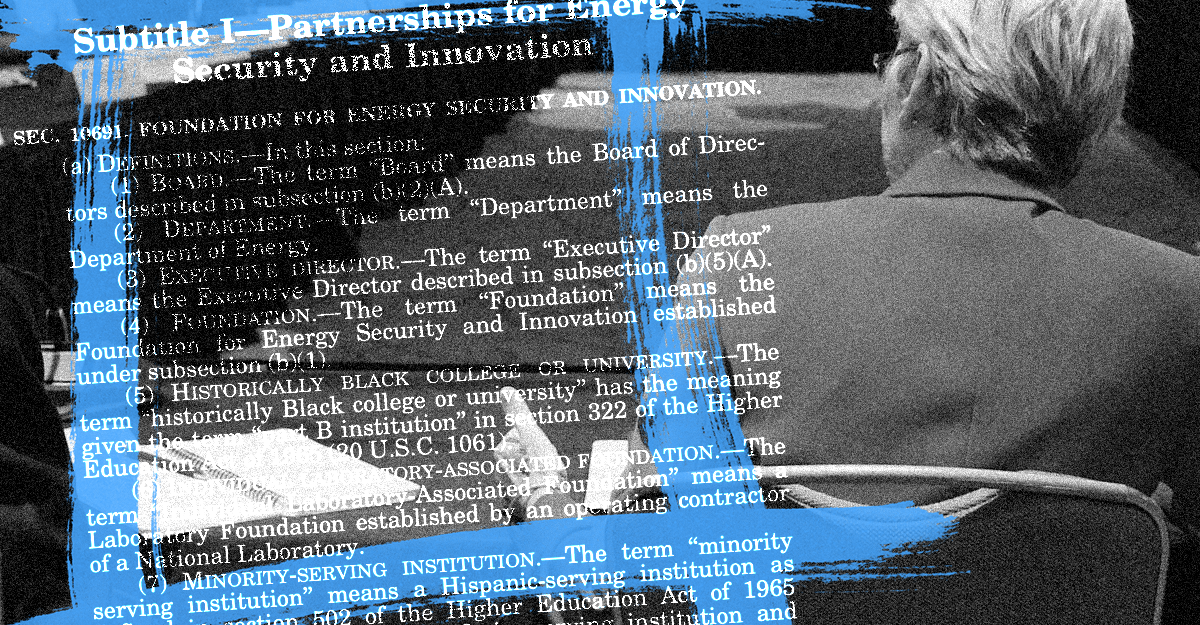
Building a Firm Foundation for the DOE Foundation: It All Starts with a Solid Board
The U.S. Department of Energy (DOE) has a vital mission: “to ensure America’s security and prosperity by addressing its energy, environmental and nuclear challenges through transformative science and technology solutions.” In 2022’s CHIPS and Science Act, Congress gave DOE a new partner to accelerate its pursuit of this mission: the Foundation for Energy Security and Innovation (FESI). As ‘Friends of FESI’ we want to see this new foundation set up from day one to successfully fulfill the promise of its large impact.
Once fully established, FESI will be an independent 501(c)3 non-profit organization with a complementary relationship to DOE. It will raise money from non-governmental sources to support activities of joint interest to the Department and its constituents, such as accelerating commercialization of next-generation geothermal power and bridging gaps in the clean energy technology innovation pipeline.
Judging by the success of other agency-affiliated foundations that served as a template for FESI, the potential for the Foundation’s impact is hefty. The National Fish and Wildlife Foundation, chartered by Congress to work with the Fish and Wildlife Service, for instance, is the nation’s largest non-governmental conservation grant-maker. In fiscal year 2023 alone, the NFWF awarded $1.3 billion to 797 projects that will generate a total conservation impact of $1.7 billion.
FESI’s creation is timely. As the U.S. races to net-zero, the International Energy Agency estimates that at least $90 billion of public funding needs to be raised by 2026 for an efficient portfolio of demonstration projects. For perspective, the most recent yearly budget for the entire DOE is just slightly more than half of that number. Non-DOE funding to support innovation is essential to ensure that energy remains affordable and reliable. DOE’s mission is a vital national interest, and the Department needs all the help it can get. The stronger FESI is, the more it will be able to help.
This week, Secretary of Energy Granholm took the first official step to create FESI by appointing its inaugural board. The board consists of 13 accomplished members whose backgrounds span the nation’s regions and communities and who have deep experience in innovation, national security, philanthropy, business, science, and other sectors.
A strong founding board is an essential ingredient in FESI’s success, and we are pleased to see that its members reflect the bipartisan support that FESI has had since legislation to form it was first introduced. While non-partisan technical and market expertise is vital to make objective judgments about hiring and investments, bipartisan relationships will ensure that FESI is sustained through changes of partisan control of Congress and the presidency.
Another key to FESI’s success will be stringent conflict of interest rules. Public-private partnerships, like those that FESI will foster, are always at risk of being subverted to pursue only private ends. It is equally important for FESI to also prioritize transparency and oversight of compliance with these rules to avoid the appearance of any conflict of interest that would undermine its progress.
What Happens Next?
In the coming weeks and months, the FESI board will hire a CEO and other leaders. This board will set FESI’s agenda and initial priorities, and later down the line, it will also eventually appoint its own successors. Its imprint will be long-lasting. The organizational culture the board creates will strongly influence whether FESI will make a real difference for energy, climate, science, national security, and the economy. As ‘Friends of FESI’ we are eager to see what the FESI board decides to take on first.
To learn more about the Inaugural FESI Board nominees, check out the DOE press release here.
How DOE can emerge from political upheaval achieve the real-world change needed to address the interlocking crises of energy affordability, U.S. competitiveness, and climate change.
As Congress begins the FY27 appropriations process this month, congress members should turn their eyes towards rebuilding DOE’s programs and strengthening U.S. energy innovation and reindustrialization.
Politically motivated award cancellations and the delayed distribution of obligated funds have broken the hard-earned trust of the private sector, state and local governments, and community organizations.
Over the course of 2025, the second Trump administration has overseen a major loss in staff at DOE, but these changes will not deliver the energy and innovation impacts that this administration, or any administration, wants.